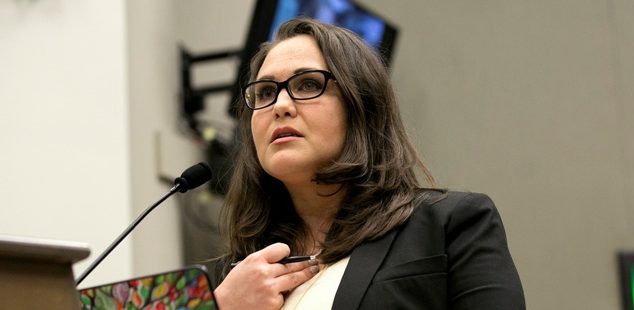News
Secrecy looms over sexual misconduct claims
 Lobbyist Pamela Lopez testifies before an Assembly committee about sexual harassment in the Capitol. (Photo: Rich Pedroncelli/AP
Lobbyist Pamela Lopez testifies before an Assembly committee about sexual harassment in the Capitol. (Photo: Rich Pedroncelli/APLeaders in the California Senate and Assembly have promised transparency as they combat sexual harassment in the Capitol, but so far most information from misconduct investigations remains hidden from public view.
“This is just the beginning of the long road to overhaul the way the California Legislature handles complaints of sexual harassment,” Senate Leader Kevin de León, a Los Angeles Democrat, said at a news conference Thursday. “The Senate remains committed to working with the Assembly to adopt a unified, bicameral approach.”
The Legislative Open Records Act exempts investigations into sexual misconduct allegations from public records requests, said Debra Gravert, chief administrative officer for the Assembly Rules Committee.
And although the Senate announced a contract with lawyers from two independent firms to investigate sexual harassment complaints, attorney-client privilege ultimately could shield the investigations from public disclosure.
Leaders in both chambers have said they plan to make additional reforms, but it’s unclear how much more information will become public.
The rules committees in both chambers currently field sexual assault and harassment complaints involving people who work in the Capitol. In the past, investigations into serious sexual harassment complaints have been conducted by outside legal firms.
The two-year contract the Senate announced last week is intended to ensure investigations are conducted impartially. The firms will give the Rules Committee their findings, which will be protected under attorney-client privilege, said Deborah Maddux, one of the attorneys hired by the Senate.
“In this case, none of that applies. It’s still clouded in secrecy.” — Alicia Lewis
The changes don’t go far enough, said Alicia Lewis, an organizer with the We Said Enough campaign to combat harassment at the Capitol.
Workplace harassment and retaliation complaints need to go through an independent entity not employed by the Legislature, she said. The investigators should be accountable to the people of California, not the Legislature, and should be subject to public transparency laws.
Californians deserve “sunshine on your government’s decision making,” said Lewis, who has worked as a staffer in both houses of the Legislature.
“In this case, none of that applies,” Lewis said. “It’s still clouded in secrecy.”
The two chambers should develop an unbiased process to determine what information becomes public and what consequences perpetrators face, said Assemblywoman Laura Friedman. The Glendale Democrat leading reforms in the Assembly said she thinks it’s good to have outside law firms investigate complaints but worries the Legislature can’t assess the results of the investigations without bias.
“My issue is what happens to that information when it comes back” to the Legislature, she said. “The less subjective all of this can be, the better — the less potential there is for selectively applying rules.”
De Leon confirmed two investigations into sitting senators accused of inappropriate conduct: Sen. Bob Hertzberg of Van Nuys and Sen. Tony Mendoza of Artesia.
As of last week, the Assembly was having outside law firms conduct seven investigations, Gravert said. Those include investigations into Los Angeles assemblymen Raul Bocanegra, who resigned last month, and Matt Dababneh, who says he will resign at the end of the year.
De León’s office said the Senate does not generally comment on open investigations, but confirmed two investigations into sitting senators accused of inappropriate conduct: Sen. Bob Hertzberg of Van Nuys and Sen. Tony Mendoza of Artesia.
De León said his office is working to release more information about sexual misconduct investigations at the Capitol.
“Part of changing the culture is to be more transparent,” he said, adding there is a “possibility” he will consider waiving some attorney-client privilege to make information about future investigations public.
He did not specify what information the Senate would make public but promised victims’ names would be kept confidential.
The Senate earlier announced a confidential hotline to report complaints and free counseling services for people who have experienced harassment. The Assembly has also promised a hotline and counseling services and has begun holding hearings to update its workplace harassment policies.
At an Assembly hearing last month on workplace harassment, Gravert said privacy concerns compel the Legislature to avoid identifying people who have been disciplined for misconduct.
“Unfortunately, if you name the perpetrator you could be violating the privacy of a victim,” Gravert said. “It’s our responsibility to protect the privacy of other individuals involved.”
Senate Republican leader Patricia Bates said she believes investigations need to be transparent while still protecting witnesses’ and victims’ identities.
The Laguna Niguel senator praised de Leon’s decision to hire outside firms and said she was confident their investigations would be independent.
“It’s moving in the right direction,” she said.
Want to see more stories like this? Sign up for The Roundup, the free daily newsletter about California politics from the editors of Capitol Weekly. Stay up to date on the news you need to know.
Sign up below, then look for a confirmation email in your inbox.

Leave a Reply